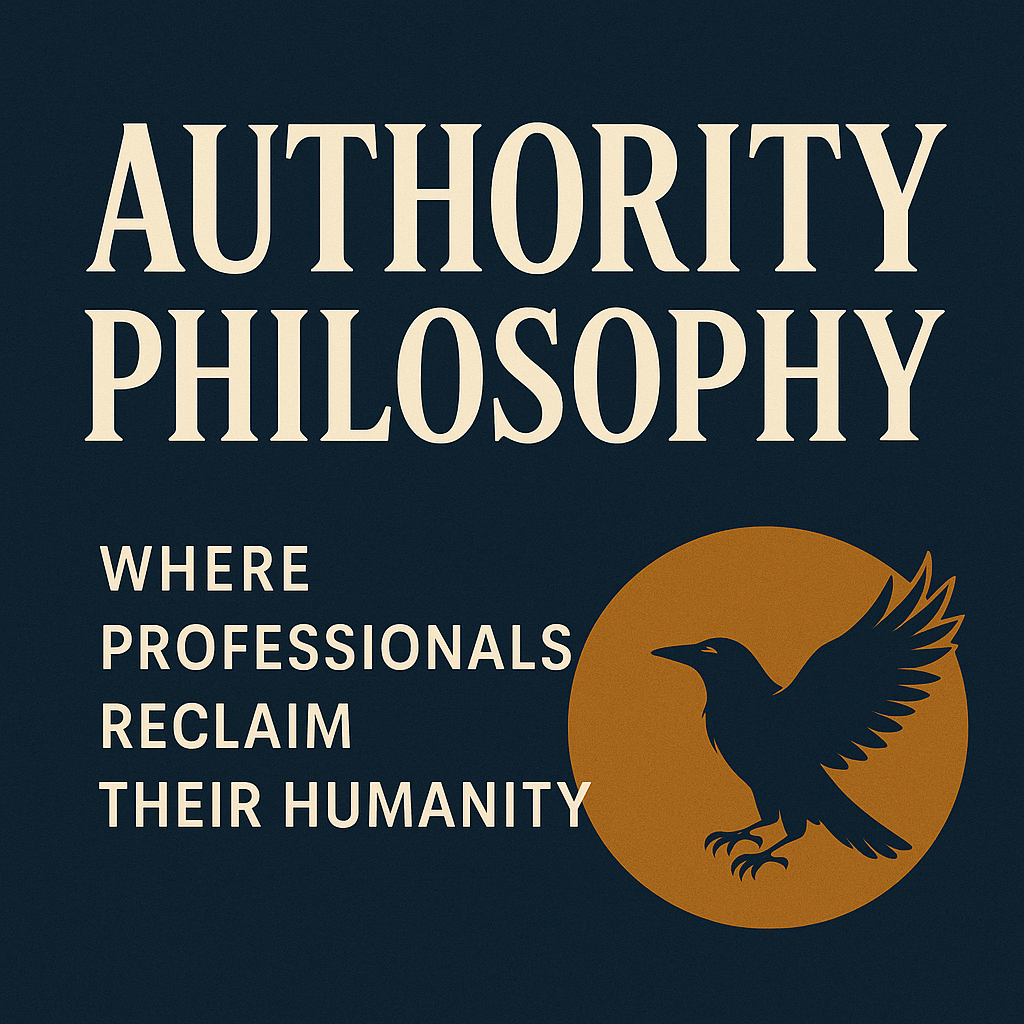
Episode Summary
Title: Build Your Own Table: Why True Authority Lives on Owned Land, Not Rented Platforms
In this episode of Authority Philosophy, Carl Taylor tackles the critical difference between building a brand on “rented land” like LinkedIn versus creating assets on “owned land” like a personal website, podcast, or book. Drawing on his own frustrating, Kafkaesque experience of being permanently banned from LinkedIn, Carl argues that relying on social platforms is a dangerous strategy that leaves professionals vulnerable to arbitrary rules and sudden loss of access. He makes a passionate case for professionals to “build their own table”—to create a core of owned authority assets that act as a stable foundation, providing the leverage needed to earn guest spots, attract ideal clients, and build a future-proof business that doesn’t rely on asking for permission.
Key Takeaways:
- The Danger of “Rented Land”: Why building your entire brand on a platform you don’t control is a high-risk strategy that can backfire without warning.
- Build Your Own Table: The importance of creating your own podcast, blog, or book as a “home base” that you own completely, giving you the freedom to speak authentically to your audience.
- The Flywheel of Creation: The more you build your own assets, the easier it becomes to get invited to other platforms. True authority earns invitations rather than begging for them.
- Niche Down to Level Up: How defining a laser-focused authority philosophy (e.g., a nutritionist for IBD, not just a “nutritionist”) is the key to attracting premium, high-loyalty clients and dominating a market.
Podcast Transcript: Authority Philosophy, Episode 4
(Intro Music)
Announcer: You’re listening to Authority Philosophy, the podcast where professionals reclaim their humanity one story at a time. Brought to you by Books for Experts, creators of books and authority assets for professionals. In a world of experts, be the authority. Learn more at BooksForExperts.com.
Carl Taylor: Welcome to Authority Philosophy. I’m going to speak today about a topic that’s near and dear to my heart. It’s not something I invented, but it’s the idea that you have to build your own table; you can’t wait for someone else to invite you to theirs.
It’s the same in our professions. One of my favorite concepts is that you have to have ownership over what’s important to your business. Renting a platform can be very dangerous. Asking for permission is necessary but can be disheartening.
My Kafkaesque Experience with LinkedIn
Case in point: when I first started Books for Experts, I joined LinkedIn. I had been on and off it for years and never really found much value from the platform. So, I went back on LinkedIn, and I got booted off. It said maybe my account had been compromised. It was a brand new account, so I’m thinking maybe something went wrong on their end. It said to provide them with my driver’s license and a biometric portrait of my face. I felt like a fool doing it, but I did it. Then I got an email saying, essentially, “You’ve breached our policies, you’re off LinkedIn.”
I don’t know what I did wrong. I was only on it for a week. But it just felt so Kafkaesque. I looked it up online and other people were experiencing the same exact thing. Apparently, LinkedIn just doesn’t really care.
It really taught me the importance of this: in today’s world, so much of what’s out there for businesses is rented land. You go onto LinkedIn and you’re subject to their policies—written or unwritten, known or unknown—and they can pull the rug out from underneath you at any second. You don’t get back your posts, you don’t get back your profile. I don’t want to build my authority on other people’s rented land. Luckily, that happened to me very early on because that was a great lesson.
Respectfully, a ton of LinkedIn is marketing sludge. It’s people taking AI-written crap and posting it. It’s people talking like we’re all Kumbaya, like business is war, but outwardly on LinkedIn, we’re all holding hands. And it’s crap. The good news is I was forced out of the crap early.
The Power of Owned Platforms
When you own your own means of production—your own podcast—you can speak truthfully. I don’t have to worry about anyone’s audience except for my own. That’s the beauty of it.
You should also go out and try your best to connect with others. I try to get invited as a guest on other people’s podcasts, and I get rejected a lot. And that’s okay, because I have my own podcast. Who wants to be a guest in somebody’s house forever? You don’t. If you can go speak at conventions, give CLEs, or write articles that get published in major venues, then do it. But that’s something you’re doing in tandem with building your own things.
The irony is, the more you build your own stuff, the more welcome you are at other people’s tables. But you’re not going to get there unless you build your own first. And even when you start being the chief guest, guess what? You still have to keep building your own stuff, because your own audience is always way more valuable.
Translate, Don’t Just Talk
When you make your own books and your own blog posts, something bigger happens. You start to really not just become known as an authority, but you start to feel like one. You start to understand how to sell without being pushy and how to educate the public in a way they can understand. You start to become a better translator.
I always think the biggest thing that we do for clients is we help them translate because it’s very hard for professionals to speak in a manner that their clients can really understand. When I would speak to my divorce clients, I’d break it down in little chunks. It’s the same thing we’re doing now at Books for Experts. We’re taking a really complex thing—how to actually build a real brand that’s future-proof—and we’re trying to make it bite-sized and manageable.
The hardest thing is putting yourself out there, and that’s why you need the authority assets to do the selling for you. It’s so much easier to sell a book than it is to sell yourself.
Building Your Table, One Plank at a Time
Every day I get up and I write 3,000 fresh words for my business. That becomes my podcasts, my books, my blog posts, my web copy. It becomes the flywheel that I use to spin this business forward. That’s the system I use to build my own table. I’m building this plane in the air.
If you have two partners and you can’t get on the same page, you need to figure out the recipe, or else you’re going to have some kind of hodgepodge that’s really, really difficult on everyone’s digestion and impossible to sell.
Niching Down to Build a Better Table
If you’re creating the same table as everybody else, is it really your own? That’s where what I call the “laser beam focus” needs to come in. For me, with this ulcerative colitis diagnosis, I need nutritional help. The average business person would say, “I’m a nutritionist.” Well, that’s great, but it doesn’t tell me much. One level deeper: “I’m a nutritionist who helps people with irritable bowel diseases like Crohn’s disease and ulcerative colitis.” Now you have my attention.
If that was a Books for Experts client, it would go even deeper. It would be, “My philosophy is I really believe that only whole foods should be eaten, because the chemicals in certain foods are the cause of some of the flare-ups.” Now you have me, because you have the expertise I desire, a relatable background, and you’ve got that laser beam, the nutritional Bat-Signal.
Most experts are so afraid to niche down. But when you do, you get the right clients who will leave you great reviews, who will be happy to work with you, and will be willing to pay more to work with you.
If you are that niche nutritionist, we’re writing a book on that subject. We’re not just going to take clients locally; we’re going to get clients nationally. You’re going to create this beautiful, elaborate table that’s going to sustain your business for the next 20 or 30 years.
A lot of people put the cart before the horse. They’re on TikTok. No, you create the authority assets, then you bring them out and you share them.
The Power of Loyalty
When you get that specific, you know what else happens? You get loyalty, which is really the currency of any professional service practice. Without loyalty, clients are more likely to leave you a bad review you didn’t earn. They’re way more likely to be price-conscious. With loyalty, people are willing to pay what you’re charging because they want to work with you specifically, not just a lawyer, not just a nutritionist, but you.
This is not easy. You have to really think. And it’s really hard to find time to think in today’s world. It took me a lot of time to really figure out, what was my philosophy for Books for Experts? And what I realized was, I’m doing this because I want to humanize the professions. I see such a commodification, and it makes me so frustrated.
Why would you be in business for yourself if you didn’t want to build exactly what you want to build? If you’re going to take all this time and effort and work harder than a W-2 employee ever would, why are you trying to build the same table as everyone else?
If you want to future-proof your business, you better know who the hell you are, who you’re marketing to, and what exactly the specs for your table are. If you can do that, your phone’s gonna be ringing, asking you to come onto podcasts, asking you to come to their table. You’ll start saying “no” 100 times for every time you say “yes,” when in the beginning, you get 100 nos for every yes.
When you’re sitting at somebody else’s table, you have to mind your manners. But if you have your own table, they have to impress you.
(Outro Music)
Announcer: Thank you for listening to Authority Philosophy, hosted by Carl Taylor and brought to you by Books for Experts. In a world of experts, be the authority. Subscribe, share, and start building your authority assets today at BooksForExperts.com.
Internal Linking: When this is posted, we must link phrases like "authority assets," "authority philosophy," and "books for experts" to the relevant pages on our site.
